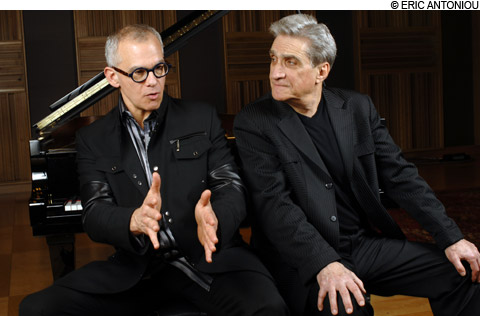
PLAYERS Pinksy (right) didn't want Hobgood to "illustrate" the text with his playing — but to improvise on the sound. |
Listen: Robert Pinsky's PoemJazz. I think I know what you're thinking. Robert Pinsky? Again? The most visible of all living American poets — three-term US Poet Laureate, relentless proselytizer for the art of verse, and, here in Boston, an inescapable presence at readings and public events where he lends his voice and his name. And now he's giving that voice and name to something called PoemJazz — a double-whammy, for sure. Haven't we seen and heard enough "poem jazz" — a once noble merging of the two art forms that has come down to us as Beat-generation nostalgia and the hangover of too many open-mic "spoken word" nights and "slams"?It's not that Pinsky — and his collaborator, pianist Laurence Hobgood — hadn't anticipated this reaction. "Bongos and the whole Dobie Gillis, coffeehouse stereotype," Hobgood concurs when I get him on the phone. It's something he says he imagined Pinsky wanted to avoid "at all costs." When I get Pinsky on a separate call he says that in live performance, "I can always see that people are afraid it's going to be embarrassing."
We get our chance to vote yea or nay this Friday, when Pinksy and Hobgood bring PoemJazz to the Regattabar. And here's the good news: on disc, at least, PoemJazz works. A great deal of that success lies with the fact that the pieces herein — all by Pinsky but for Ben Jonson's "His Excuse for Loving" — work as music.
The notion of poetry with jazz suggests horn players and pianists vamping along impressionistically, reacting to lyric content, digging those crazy stanzas! But Hobgood — though he did mostly improvise on the spot in two studio sessions — plays forms. Key and chord changes hug Pinsky's verse closely. Exits and entrances, "solos" for voice or instrument, have a compositional logic. Pinksy, meanwhile, uses repetition as an effective song-like device. What's more, the two have a knack for resolving "choruses" in sync.
Hobgood is self-effacing about all of this. It is, after all, what jazz musicians do: improvise motivically over a given theme. In this case it was the sound of Pinsky's voice and words that provided the theme. As Pinsky spoke, Hobgood followed the text, reading ahead, anticipating the "changes." At the beginning of one outtake from the sessions, for Pinsky's "The Green Piano," you can hear Hobgood ask, "Walking bass or stride?" "Stride," Pinsky answers, and the jaunty, easy left-hand oom-pahs provide a piquant tension to the text, a family tale that is alternately comic and harrowing.
"The main thing you're doing," says Pinksy about the relation of piano to poem, "is that you're not interpreting it or illustrating it. You're thinking, 'How do I do that with the sounds of the words?' " Pinsky once aspired to be a jazz saxophonist, and these days he still noodles around at a keyboard, by himself, wearing headphones. He sees himself as "playing" these pieces rather than reading them. And PoemJazz has restored something he's missed — playing with other musicians. Over the years he's done poetry and jazz with a number of players, including, in Boston, Stan Strickland and Rakalam Bob Moses. In Hobgood he has a partner who is especially adept at matching music to words, having worked for years as accompanist for singer Kurt Elling — who, it so happens, has adapted one of Pinsky's poems, "The City," to music.